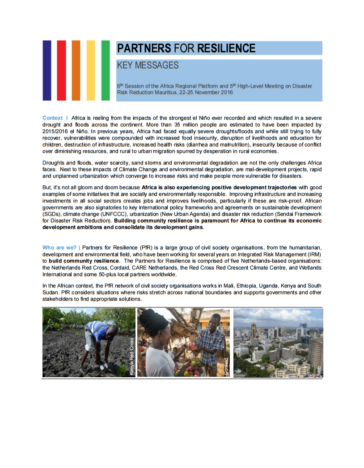
Investments in wetlands highlighted at African Regional Platform on DRR starting today
-
Climate and disaster risks
-
Community resilience
Today the 6th Africa Regional Platform on Disaster Risk Reduction opens in Mauritius, which is expected to conclude with the adoption of a plan for implementation of the Sendai Framework for Disaster Risk Reduction across Africa. The Partners for resilience alliance works in Mali, Ethiopia, Uganda, Kenya and South Sudan to support governments and others stakeholders to integrate climate change adaptation and ecosystem management and restoration into disaster risk reduction.
Africa is reeling from the impacts of the strongest el Niño ever recorded and which resulted in a severe drought and floods across the continent. More than 35 million people are estimated to have been impacted by 2015/2016 el Niño. In previous years, Africa had faced equally severe droughts/floods and while still trying to fully recover, vulnerabilities were compounded with increased food insecurity, disruption of livelihoods and education for children, destruction of infrastructure, increased health risks, insecurity because of conflict over diminishing resources, and rural to urban migration spurred by desperation in rural economies.
Droughts and floods, water scarcity, sand storms and environmental degradation are not the only challenges Africa faces. Next to these impacts of Climate Change and environmental degradation, are mal-development projects, rapid and unplanned urbanization which converge to increase risks and make people more vulnerable for disasters.
African governments are signatories to key international policy frameworks and agreements on sustainable development (SGDs), climate change (UNFCCC), urbanization (New Urban Agenda) and disaster risk reduction (Sendai Framework for Disaster Risk Reduction). Building community resilience is paramount for Africa to continue its economic development ambitions and consolidate its development gains.
Key messages of the Partners for Resilience alliance, consisting of the Netherlands Red Cross, Cordaid, CARE Netherlands, the Red Cross Red Crescent Climate Centre, and Wetlands International and some 50-plus local partners worldwide at the Africa Regional platform are:
Acknowledgement and investments in wetlands
Acknowledgement of the key role of Sahelian floodplains and Sub-Saharan river basins and wetlands systems to regulate water flows and therefore prevent droughts and floods. Investments in these natural systems is an effective climate adaptation strategy and support of resilient livelihoods of local communities.
Close involvement of communities
Communities at risk of disasters should be partners and remain central in policy and programme design & implementation. Investments in DRR must be strengthened at local level and ensure local structures link to sub-national and national mechanisms.
Commit resources for drought/management
Because of increased frequency of droughts/floods, all stakeholders should support African Governments to fast-track the operationalization of the Drought Resilient and Prepared Africa Strategy endorsed at the 2016 Namibia African Drought Conference, to develop Country Specific Drought Resilience Programmes and commit resources for drought/management, all of which link to Sendai Framework on DRR, SDGs, UNFCCC and New Urban Agenda.
Avoid re-inventing the wheel
African Governments, through the leadership of the African Union should be supported by all stakeholders, to commit to a systematic way to review progress attained in various African agreements and commitments made on risk reduction initiatives to avoid re-inventing the wheel. This requires the cooperation and collaboration of all stakeholders. There are national initiatives already on-going to track resilience initiatives, thus at continental level, policy discussions must recognise these efforts in ‘new’ commitments.

